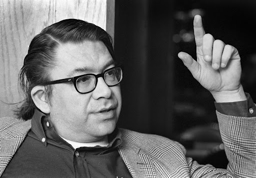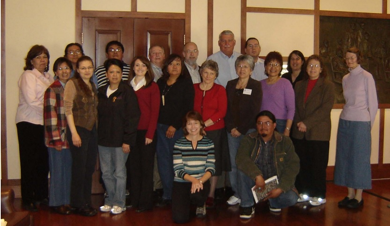
Generally speaking, archives should exist to contain our history and help us connect with our past. However, this hasn’t always been the case for tribes in the United States. During the 1970s and 1980s, when many tribes were looking to restore tribal recognition, they had a hard time finding what they needed. This lead to a growth period for tribal archives, spurred on in part by Vine Deloria’s “The Right to Know,” a call for action to address the need for access to tribal materials.
This past week, we learned more about these tribal archives in class, both those that are run by tribes themselves, as well as tribal collections housed in non-native archives. Guest speaker Jennifer O’Neal joined us as well to talk about her work and research concerning Native American archives.
“Decolonizing Native American Archives”

Jennifer O’Neal is currently the University Historian and Archivist at the University of Oregon, and she has previously worked as Head Archivist at the National Museum of the American Indian. She graduated in the first cohort from Knowledge River, the LIS program at University of Arizona focused on addressing the information needs of Latino and Native American communities.
During her Skype presentation to us, she filled us in on some of her research and the projects she has worked on. In her work, she has taken on a decolonizing approach to tribal archives. What this entails is working towards managing tribal archives and collections in a way that is based in Indigenous knowledge instead of Western ideas. An example of this is the Southwest Oregon Research Project (SWORP), which has helped repatriate thousands of records in federal repositories to tribes in Oregon. This allows tribal members to more easily research their own culture and rewrite their own histories in a way that is respectful of the culture.
Protocols for Native American Archival Materials
The creation of the Protocols for Native American Archival Materials has also been a big part of decolonizing tribal collections. Drafted in 2006, they were intended to act as guidelines for non-tribal archives that held Native American archival materials. The hope was that it would help open up communication between tribal and non-tribal repositories.

Lucky for us, Jennifer was one of the drafters of the protocols, and she gave us some additional insight into the creation of the protocols. She mentioned that the main goals they had in mind while drafting the protocols were:
- Improve existing relationships
- Build new interactions between communities
- Foster respect and recognition of tribal communities
- Create reciprocity through collaborations
- Share stewardship of collections
- Advocate for Native American values and perspectives
In may ways, TLAM and our projects with the Oneida and Red Cliff communities honor the goals of the protocols, so it was nice to learn more about them.
Thank you, Jennifer, for joining our discussion and sharing the work that you do!
– Carolina Hernandez
Check out one of Jennifer’s articles here:
O’Neal, Jennifer R. (2015) “”The Right to Know”: Decolonizing Native American Archives,” Journal of Western Archives: Vol. 6: Iss. 1, Article 2.
Available at: http://digitalcommons.usu.edu/westernarchives/vol6/iss1/2
